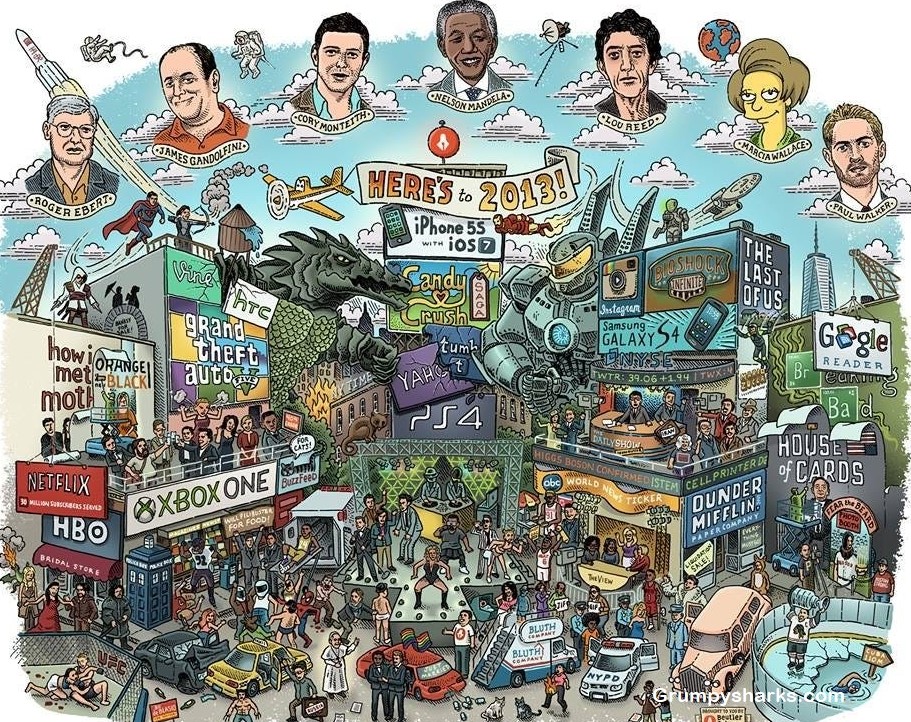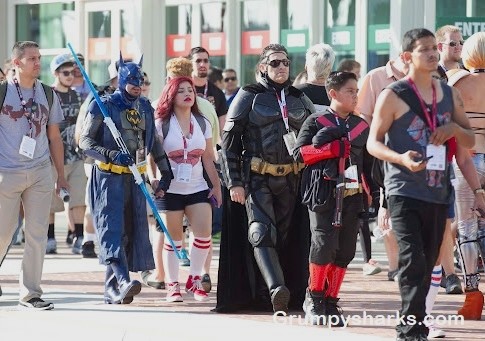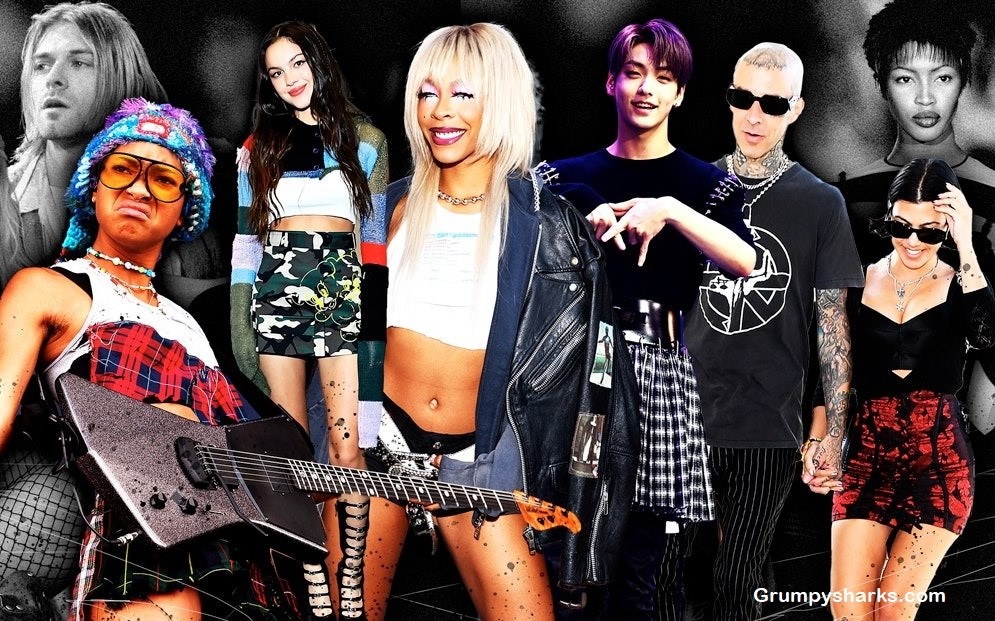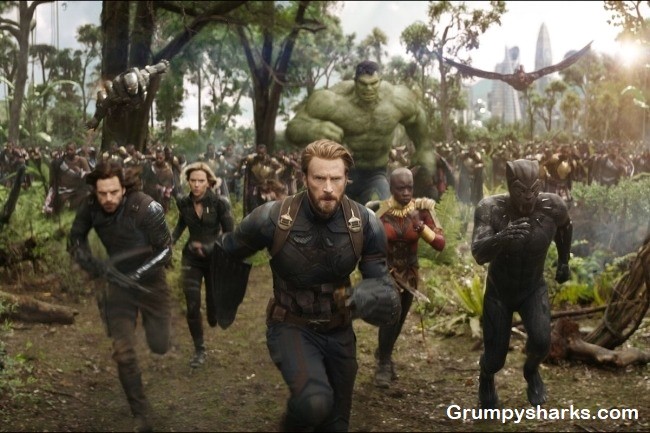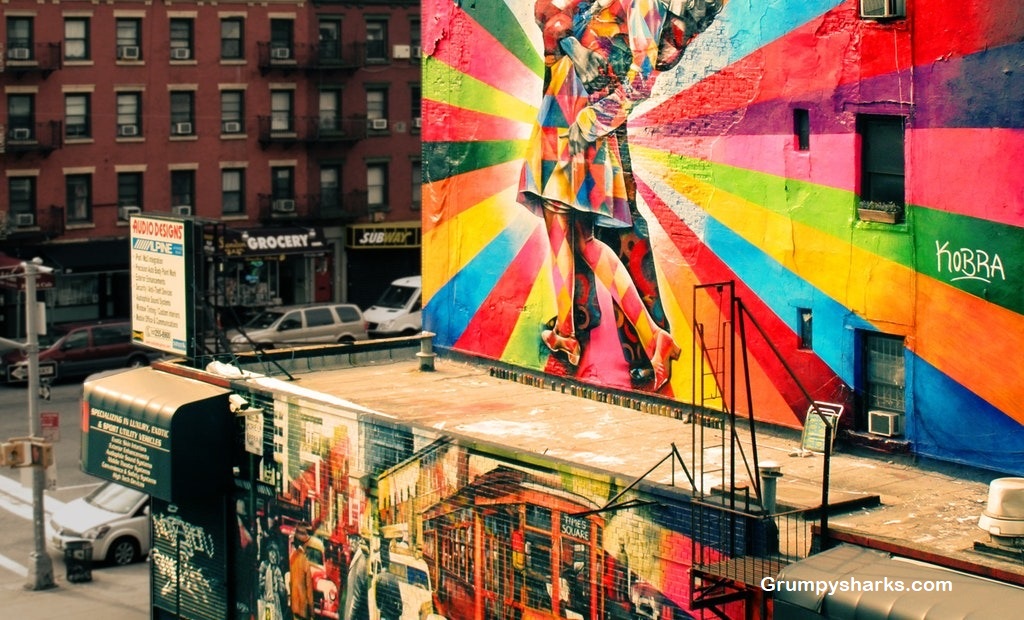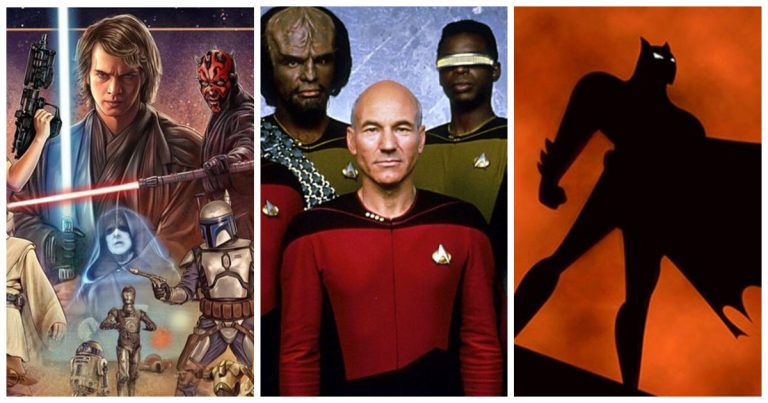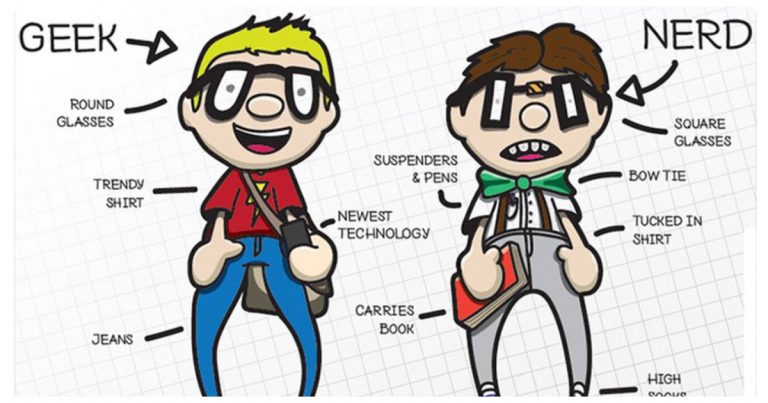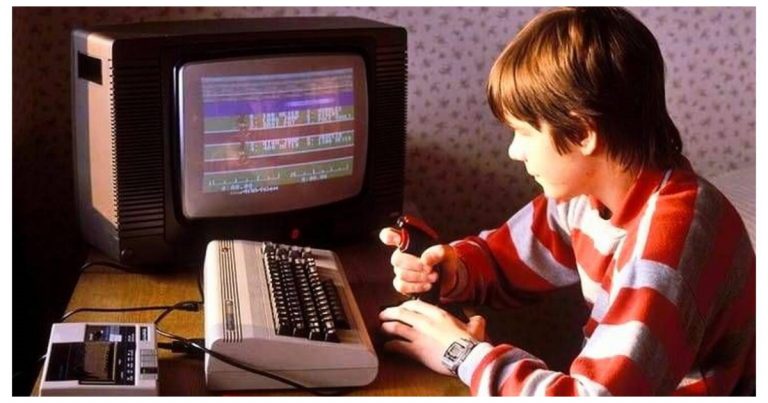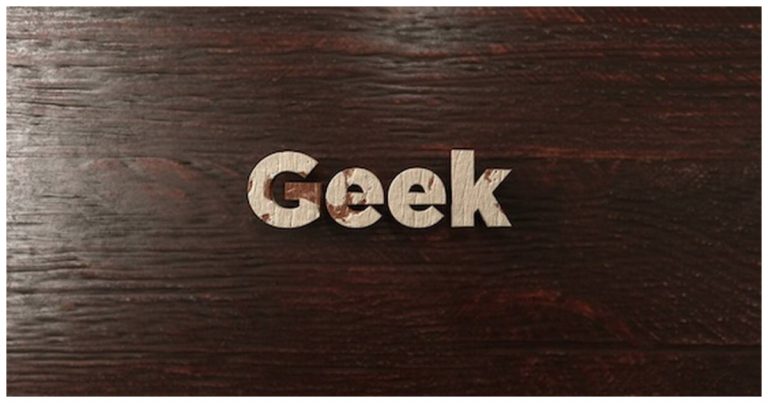Geek Culture vs. Pop Culture: How the Lines Have Been Blurred in the 21st Century
As recently as the 1990s, the barriers between geek culture and pop culture were very clear. Geek culture was the exclusive domain of communities with a small and neglected niche following, while mainstream culture would dominate and shape global trends. In the 21st Century, the barriers are a bit more murky.
At Grumpy Sharks, we want to unpack how geek culture, which started as an sf comic-centric subculture of video games and science fiction, became a force in mainstream culture to create films and TV series that have dominated Hollywood and the world of entertainment (and beyond!) including social media, streaming services and fashion. Today’s article addresses how geek and pop culture have become intertwined and combined to influence our entertainment, global trends and experiences of fandom in the modern world.
#1 What Is the Rise of Pop Culture?
Pop culture has grown into a vast entity that has the potential to impact nearly every facet of our day-to-day lives. Pop culture is a part of nearly everything we do: the music we listen to, the movies we see, the media we consume, and it even defines how we choose to act within our environments. While pop culture initially developed within the entertainment sector, it has diversified into something that embodies our beliefs, values, identity, and politics.
1. Pop Culture as a Reflection of Popular Mainstream Media
Pop culture has always played off whatever has been most popular in mainstream entertainment; whether it be music, TV, movies, or celebrities. Pop culture can indicate how our identity plays into the narrative as an entire community during a significant cultural moment. Where the Beatles took over most of the 60s, to superhero blockbusters creating cultural moments today, entertainment becomes a part of our lives defining just not what we watch but how we see our own culturally “created” identities.
2. The Propagation of Pop Culture Via Television, Radio, and now Social Media
In the past, pop culture found its way deep into society by way of pieces like television shows and radio broadcasts that introduced important cultural milestones into households everywhere. Nowadays, social media has assumed the role of pop culture’s main conveyor, rapidly making widespread cultural phenomena a global sensation in days, or sometimes, hours, instead of months or even years. Instagram, TikTok, and YouTube among others allow anyone to create, share, and make trends almost instantly. Pop culture has transitioned from a passive observer experience, to an active, fluid exchange across societies.
3. How Has Pop Culture Historically Been Trend Based and Mass Marketed?
Pop culture has always been centered on trends, and in order to cultivate mass appeal. If you look back, these trends may have been in fashion, music or film, but always reflecting content that could capture the interest of the largest audience. Trends have provided a heartbeat for pop culture—in the moment-it describes what we wear, what we listen to, and how we communicate with one another, while defining how we both produce and consume our media. Additionally, trends create not only entertainment norms, but provide a foundation for what we consider to be “cool”.
#2. How Geek Culture Blurred the Lines In The 21st Century?
In the 21st century, it has become increasingly blurry where geek culture and pop culture start and end. What once was once fairly niche and subcultural has been absorbed by mainstream entertainment, impacting everything from blockbuster movies to global gaming escapism. In fact, the erasure of the line between geek culture and pop culture reflects many of the changes in contemporary society where social meetings and once marginal interests became part of mainstream acceptance and notoriety.
1. Geek Culture is Center Stage
Geek culture has been embraced and found a place to exist outside of niche interest groups, and now occupies a center stage position within mainstream entertainment.
2. The Rise of Superhero Movies and TV
There is no denying that superhero franchises have seen overwhelming success. The Marvel Cinematic Universe (MCU) alone has grossed over $31.9 billion and counting globally! As of 2025, the MCU has grown to be the highest-grossing film franchise of all time. The overall success of comic book adaptations speaks to their success in joining the ranks of mainstream film.
3. The Popularity of Video Game Franchises
Video games have become a powerhouse of entertainment on a worldwide scale. To highlight one example: Fortnite had $3.5 billion in revenue for 2023 , and Minecraft had $220 million in revenue for 2024. These figures clearly demonstrate the financial and cultural significance of gaming.
4. The Popularity of Streaming Platforms
New streaming platforms have simply made content easier and easier to consume. In 2024, Netflix led the industry with $39 billion, followed by Disney+ with $10.4 billion, and Amazon Prime Video with approximately $14 billion. These platforms have made fandom easier and more accessible on a global scale.
#3 How Geek Culture Is Influencing Mainstream Pop Culture?
In recent years, a large number of pop culture properties and products have employed some of the basic components and tropes of geek culture.
1. Music, Fashion and Celebrities Using Geek Aesthetics
Surprisingly, various types of artists and designers are using forms of geek inspiration in their works. For example, Fortnite successfully partnered with high fashion apparel designers, like Balenciaga, to create digital and real-life apparel that embraced the digital fashion aesthetic . Now designers will embrace video gaming fashions and trends as mainstream. Many celebrities are naming their fandom and taking ownership. Elon Musk and Henry Cavill both publicly identify as avid fans of comic book nerd culture, D&D and gaming .
2. The Influence of Geek Culture on Marketing and Commercials
Brands are working to engage audiences with geek culture references. Marketers use or refer to either iconic franchises and apply, or reference it in different marketing campaigns to reach the many audiences who are enthusiastic about, and fans of these fandoms. Rather than simply selling products, brands are building cultural relevance in a fandom that makes them look legitimate because they are connected to geek culture.
3. Celebrities Identifying as a “Geek”
The increase in public figures recognizing their geek interests is even harder to ignore. For example, Elon Musk’s affection for science fiction is expressed by naming several culturally important works, such as “The Culture” series by Iain M. Banks, as formative influences for him regarding his perceptions of technology and society . Their honesty about these fandoms help normalize geek culture and point towards widespread acceptance by mainstream culture.
In summary, the 21st century has witnessed a significant blending of geek and pop cultures. This fusion reflects broader societal changes where diverse interests are celebrated and integrated into mainstream media and entertainment.
#4 How Has the Digital Age Shaped Both Geek and Pop Culture?
Digital age has created borders and collisions that, without its influence, we would never have expected may be broken. With the access of social media, streaming services, memes and the emergence of online fandoms, geek and pop culture have collided to create a new and dynamic culture that expands borders to build a global culture. The digital revolution has made geek culture accessible, popular, and mainstream.
1. What Media Facilitate for Geek and Pop Culture
The digital or social media revolution has facilitated the melding of these two cultural elements. Using social media like Twitter, Instagram, TikTok and reddit, fans can share their geeky obsessions with millions of other geek culture participants around the world. They have developed a medium in spaces where geek culture, once a niche corner of the popular culture, is now thriving; memes and media often come as wildly viral, the point of origin for the share, and help to turn the shadows of geek and into pop culture enjoyment. Take for example, the live stream of some fan unboxing their Star Wars memorabilia or explaining their insane fan theory here, about the Marvel universe; they ushered in a climactic appropriation of a spaces where geek meets pop and becomes organically interactive as well.
2. Streaming Services as Entry Points to Geek Culture
Streaming services are now key players in allowing access to geek culture and allowing geek culture to be heard and have an opportunity to establish itself in the public consciousness. Streaming giants like Netflix, Disney+, and Amazon Prime Video have developed extensive and expansive libraries of geek-related content (comics, anime, science fiction, and fantasy). Netflix’s success with The Witcher, and the many anime offerings that it has, has provided exposure of geek culture, and a way to redefine mainstream entertainment, and offer opportunities for geek culture to become more universal around the world. Streaming services have established a pathway for the availability of geek-driven content to reach consumers who may have otherwise not have a path or access to content that would be of interest.
3. The Hand of Memes, Viral Content, and Fan Products to Consolidate Cultures
In addition, memes, viral content, and fan-created and organized activities have succeeded in more easily bridging the gap between geek culture and pop culture. What may have started as a niche product, or fan creation, has now found its way into mainstream humor and expression. Star Wars memes, Marvel imaginary, and viral gaming moments have united both cultures on all aspects of the internet, successfully demonstrating that the two cultures can coalesce, and coexist. By bringing forth memes, viral activities, and fan-driven experiences, fans have successfully filled a sizeable gap in how entertainment can entertain us, while also build a shared culture around experiences, activities, and of course joy in fandom.
4. Gaming Groups and Online Discussions Making Geek Culture Accessible to All
Gaming groups and online discussions have made geek culture more accessible to everyone. Whether it’s a Reddit thread talking about a game’s latest update or a Twitch streamer having a live chat about a new anime release, the gaming realm has acted as a bridge that leads to geek culture. Online forums and Discord servers allow people of all ages, backgrounds, and passions to come together in an inclusive way, which honors our inclusivity and fosters an environment for participants to contribute, discuss, reflect, and grow their love for anything and everything geeky. This online world gives fans the ability to develop a love for something geeky, community, and togetherness as fellow geeks that can nurture their passionate interests community-wise and through discussion and dialogue while being more available to everyone in a given community.
#5 Why the Blurring of These Cultures Is a Good Thing?
The blurring lines between geek culture and pop culture are more than just a trend; they have ushered in positive change in the way that we consume entertainment and foster community. As the lines distinguishing niche from mainstream continue to dissolve, this blurring has created a more nuanced, inclusive, diverse and innovative approach to culture and cultural production. The blurring of these two cultures is not merely a validation of what is seen as “cool” at the present moment; it is about getting to share an immeasurable amount of history, identity, and creative thought.
Once-a-time undervalued genres – like sci-fi, anime, and fantasy – have tipped the scales and are now dominating the global entertainment discussion. Movies, television shows, and games that were once “uncool” to the general population are now finally reaching people who may have never consumed that form of art. This cultural evolution makes it easier for people from different backgrounds to simply find an easier way to connect, collaborate and create their truly authentic selves.
Let’s explore why we should celebrate this mix of geek culture and pop culture.
#6 Conclusion
The merging of geek and pop culture is more than a trend, but a global shift that has changed the way we think about entertainment, creativity, and community. Activities that used to be considered niche or specialized have become embedded into mainstream life, transforming everything from summer blockbuster movies, to viral memes on TikTok or fandoms on any online platform. We can now see the merging of geek and pop cultures as a new wave of inclusive, where things and interests of all varieties are appreciated and enjoyed on a global scale.
Here at Grumpy Sharks, we hope that this cultural overlap is more than a time stamp; that it is the future of entertainment where audiences will celebrate their passion for geeky things all occurrences of global content. The rise of both geek and pop cultures both show us that the stories we care about can move past borders and connect us in ways we never imagined and who knows what stories that haven’t been told or expressed in creative ways will come next.

